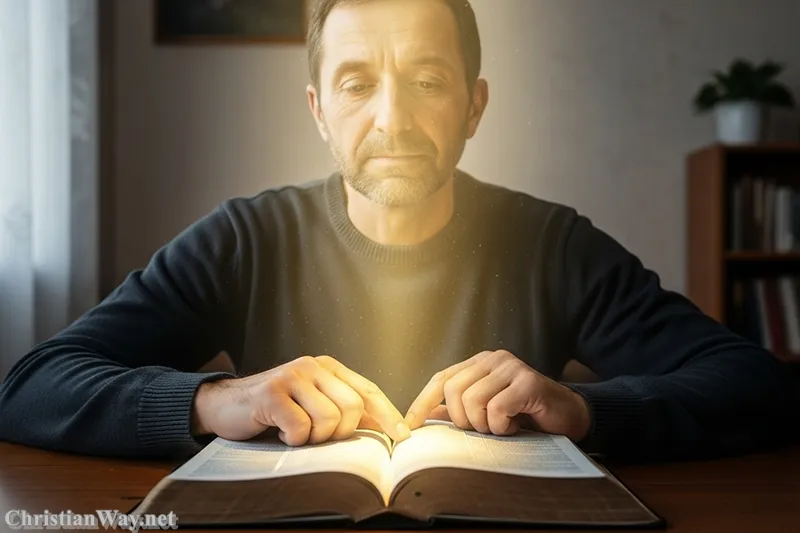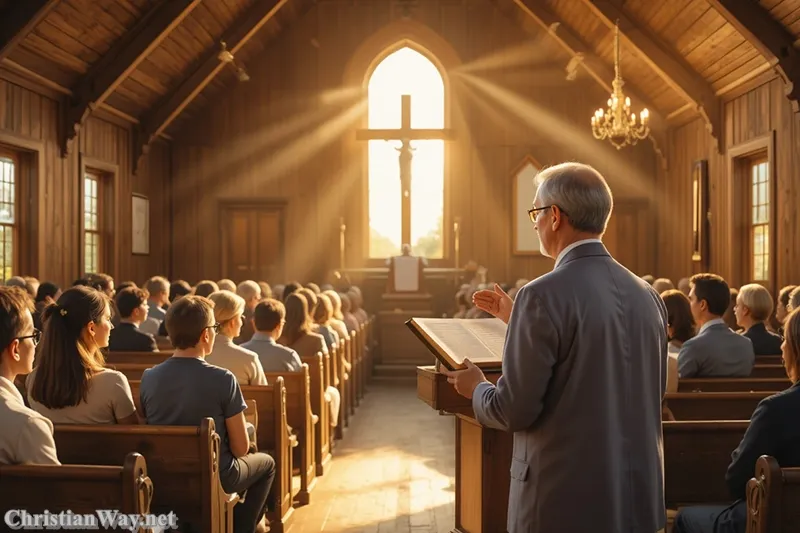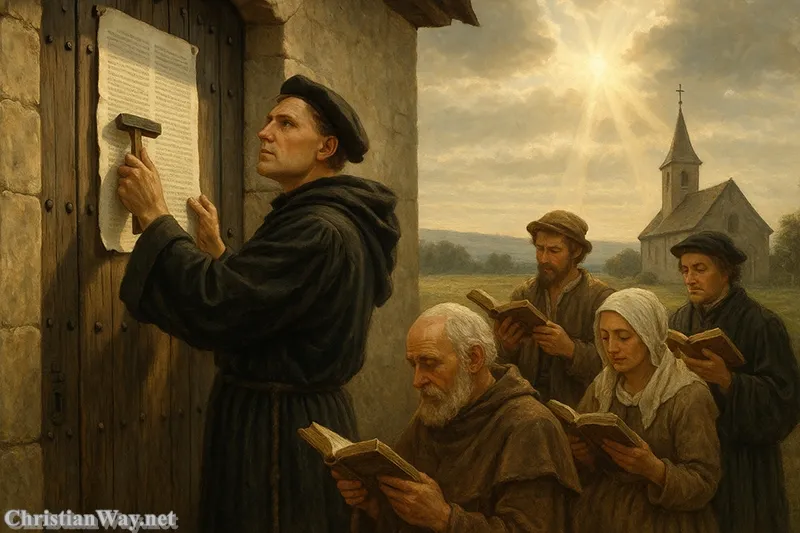Dear friends in Christ,
Every renewal in the history of the Church begins with a question that rises from the heart. In the early 16th century, one such question echoed from the cell of an Augustinian monk named Martin Luther: “How can a sinner stand righteous before a holy God?” His search for an answer would give birth to Lutheranism, one of the great traditions within Christianity. But more than a movement, it was — and remains — a testimony to the power of grace, the authority of Scripture, and the deep human longing to be reconciled with God.

In a time when faith had become entangled with political, financial, and moral struggles, Luther’s discovery of God’s justifying grace through faith alone (sola fide) shook the world. What began as an act of reform became a revolution of the heart, calling Christians to return to the Gospel’s simplicity: that we are saved not by our works, but by God’s mercy revealed in Jesus Christ.
Let us walk together through the story and spirit of Lutheranism — not as historians, but as pilgrims listening for God’s voice within the history of His people.
The Birth of Lutheranism: A Cry for the Gospel
The Struggle of a Conscience Seeking Peace
Martin Luther was not seeking to create a new Church. He sought peace — peace with God, peace within himself. As a monk, he spent long hours in confession, penance, and self-denial, yet his soul remained restless. He could not quiet the voice that said, “You are not righteous enough.”
It was while studying St. Paul’s Letter to the Romans that Luther’s heart was pierced by light: “The just shall live by faith” (Romans 1:17). In that single verse, he found the Gospel anew — not as a demand, but as a gift. He realized that righteousness is not achieved but received; it is not our climb toward God, but God’s descent to us in Christ.
This awakening transformed Luther’s theology and, soon after, the course of Christian history.
The 95 Theses and the Call for Reform
In 1517, Luther nailed his Ninety-Five Theses to the door of the Wittenberg Castle Church, not to attack the Church he loved, but to invite honest theological dialogue. His concern was the sale of indulgences, which claimed to offer reduction of punishment for sins in exchange for money. Luther saw this as a distortion of grace.
His act ignited a fire he could not contain. The questions he raised about repentance, faith, and authority reached far beyond Germany. The world heard a cry — not for rebellion, but for renewal.
The Foundations of Lutheran Faith
Sola Scriptura — The Word Alone
Lutheranism rests on a deep conviction that Scripture is the final authority in all matters of faith and life. “The Word of God,” Luther wrote, “is the rule and norm by which all doctrines and teachers are to be judged.”
This principle, known as sola Scriptura, was not meant to reject Church tradition but to anchor it in the living Word of God. For Luther, Scripture was not a book to be mastered but a voice to be obeyed — the voice of God Himself, speaking to His people in every age.
Sola Fide — Faith Alone
At the heart of Lutheranism lies the profound truth of justification by faith alone. Humanity cannot earn righteousness through works or rituals; salvation is the free gift of God’s grace. “We are justified,” Luther declared, “not because of our own worth, but because of Christ’s.”
Faith, in this light, is not mere belief but trust — a total surrender to God’s mercy. It is resting the weary soul in the promise that Jesus Christ has already done what we could never do.
Sola Gratia — Grace Alone
Lutheranism exalts grace as the heartbeat of salvation. Grace is not God’s reward for effort; it is His love freely given to the undeserving. Every human being, no matter how broken or lost, can be redeemed because God’s grace reaches further than sin.
This is why Luther could sing in his great hymn “A Mighty Fortress Is Our God”:
“Did we in our own strength confide,
Our striving would be losing;
Were not the right Man on our side,
The Man of God’s own choosing.”
Christ is that “right Man” — the eternal grace of God made flesh.
The Sacraments in Lutheran Life
Baptism: The Water of New Birth
Luther taught that Baptism is not merely a symbol, but a means through which God works grace. Through water and the Word, the believer is united with Christ’s death and resurrection. Baptism marks the beginning of a lifelong journey of repentance and renewal.
Luther often reminded his followers to “remember your baptism” — not as a past event, but as a daily assurance that you belong to Christ.
The Eucharist: Christ Truly Present
Unlike some reformers who viewed the Lord’s Supper as symbolic, Luther affirmed the real presence of Christ in the Eucharist. He rejected both the medieval notion of transubstantiation and the purely symbolic understanding. For Luther, the mystery was simple yet profound: “Christ’s body and blood are truly present, in, with, and under the bread and wine.”
This teaching reflects the Lutheran balance between faith and mystery — affirming that God is truly with His people in tangible, sacramental grace.
The Lutheran Confessions: A Faith Anchored in Truth
The theology of Lutheranism was codified in the Book of Concord (1580), a collection of creeds and confessions that include the Augsburg Confession, Small Catechism, and Large Catechism. These writings express the essential truths of the Lutheran faith — not as a new invention, but as a reaffirmation of the Gospel’s ancient message.
The Augsburg Confession in particular remains central to Lutheran identity. It proclaims that “the Church is the assembly of saints in which the Gospel is taught purely and the Sacraments are administered rightly.”
This confession binds together theology and practice, word and sacrament, grace and life — the pillars of a faith both ancient and alive.
The Spirit of Worship and Community
Lutheran worship reflects the beauty of liturgy united with the simplicity of the Gospel. Luther did not seek to abolish the Mass but to restore it. He retained vestments, candles, hymns, and the calendar of feasts — but placed Scripture and preaching at the center.
Out of this renewal grew the rich tradition of Lutheran hymnody. Luther himself composed hymns to teach theology and stir the soul, writing, “Next to the Word of God, the noble art of music is the greatest treasure in the world.”
In every Lutheran church, the Word is read, the Gospel is preached, and the faithful sing their faith in harmony with heaven.
The Global Impact of Lutheranism
Today, Lutheranism spans every continent, uniting over seventy million believers. It has given birth to universities, hospitals, and humanitarian missions that reflect the Gospel’s compassion.
Luther’s rediscovery of grace inspired not only his contemporaries but generations of Christians across denominational lines — from Methodists to Baptists, from Anglicans to Catholics, who have since revisited the meaning of faith and grace in light of the Reformation.
Lutheranism also played a key role in shaping modern Western thought — influencing education, politics, music, and social ethics. Yet its true gift lies not in cultural impact, but in its enduring message: that God’s mercy is greater than our sin.
The Ecumenical Hope
In recent decades, Lutherans and Catholics have entered deep dialogue, seeking healing after centuries of division. The Joint Declaration on the Doctrine of Justification (1999) marked a historic step, affirming that both traditions share the same core truth — that salvation is by grace through faith in Christ.
This growing unity is a sign of hope that the Reformation’s wounds need not remain open forever. In the Spirit of Christ, what began as conflict can become communion.
Faith in Everyday Life: The Priesthood of All Believers
Luther’s vision of the “priesthood of all believers” remains one of his most transformative legacies. He taught that every baptized Christian is called to serve God — not only in the pulpit, but in every vocation. Whether as parent, worker, artist, or farmer, each life is sacred when lived in faith and love.
This teaching sanctified ordinary life. It reminded believers that holiness is not confined to monasteries or churches but lived in kitchens, workshops, and marketplaces — wherever grace meets human need.
Reflect and Pray
Dear friends, the story of Lutheranism is not merely a chapter in history; it is a witness to the unending mercy of God. From Luther’s trembling conscience arose a movement that called the Church back to her first love — the crucified and risen Christ.
The message of Lutheranism remains timeless: “We are saved by grace alone, through faith alone, in Christ alone.” In a world that still measures worth by success and salvation by merit, this truth shines as a beacon of hope.
May we, too, learn from Luther’s courage and humility — to seek God not in fear, but in trust; not in works, but in faith; not in pride, but in grace.
Let us pray:
Lord Jesus Christ, You are our righteousness, our peace, and our joy.
Teach us to rest in Your mercy, to trust in Your Word,
and to live each day as witnesses of Your grace.
Unite all Christians in Your love,
that the song of faith may rise again in every heart and every land.
Amen.
— Fr. John Matthew, for Christian Way





